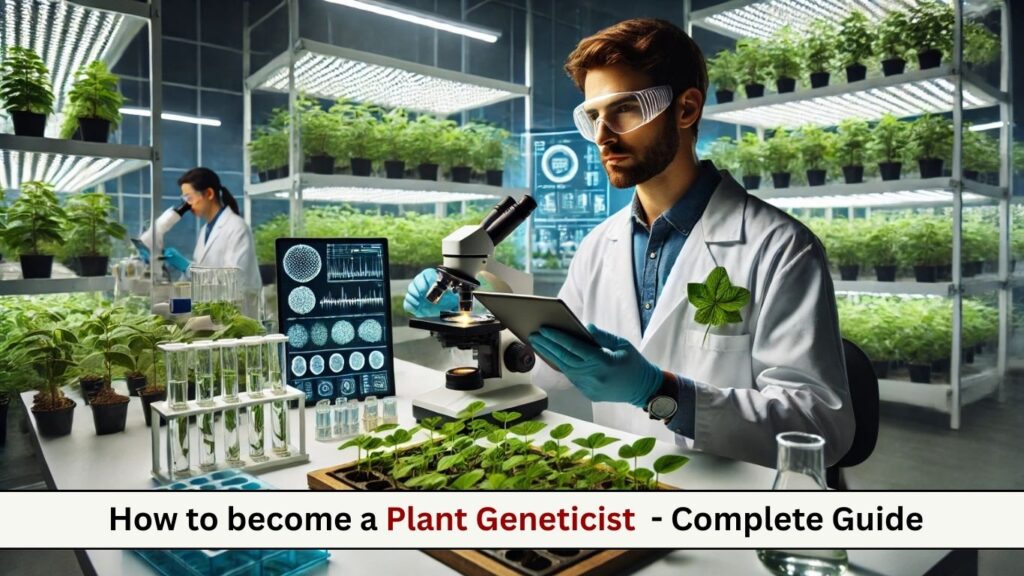
Introduction
Plant geneticists are at the forefront of agricultural innovation, developing crops that can withstand climate change, resist pests, and feed our growing population. With advances in gene-editing technologies like CRISPR, this field is revolutionizing how we grow food.
This guide covers:
- The fascinating history of plant genetics
- Cutting-edge responsibilities in the field
- Global salary ranges and career outlook
- Essential qualifications and skills
- Step-by-step career path
- Future trends in plant biotechnology
History of Plant Genetics
The science of plant genetics has evolved dramatically over centuries:
Key Milestones in Plant Genetics
- 1866: Gregor Mendel establishes inheritance laws using pea plants
- 1900: Rediscovery of Mendel’s work launches modern genetics
- 1953: DNA structure discovery by Watson and Crick
- 1983: First genetically modified plant (tobacco) created
- 1994: Flavr Savr tomato becomes first commercial GM crop
- 2012: CRISPR gene-editing technology developed
- 2020s: Climate-resistant crops enter field trials
Roles and Responsibilities
Plant geneticists work across diverse sectors with varying specializations:
Core Responsibilities
- Research & Development
- Identify beneficial plant traits
- Conduct genetic mapping
- Develop molecular markers
- Genetic Engineering
- Design gene-editing experiments
- Transform plant genomes
- Analyze transgenic plants
- Field Applications
- Supervise field trials
- Monitor trait expression
- Collect phenotypic data
- Data Analysis
- Process genomic datasets
- Use bioinformatics tools
- Publish research findings
Work Environments
- Agricultural biotech companies
- Government research agencies
- University laboratories
- Seed breeding companies
- Pharmaceutical firms (plant-based medicines)
Salary and Career Outlook
Compensation varies by sector and experience:
2024 Salary Benchmarks
| Country | Entry-Level | Mid-Career | Senior-Level |
|---|---|---|---|
| USA | $65,000 | $90,000 | $120,000+ |
| UK | £35,000 | £50,000 | £75,000+ |
| Germany | €45,000 | €65,000 | €85,000+ |
| India | ₹6-8 lakhs | ₹12-15 lakhs | ₹20-25 lakhs+ |
Job Growth: The field is projected to grow 15-20% due to:
- Climate change challenges
- Population growth demands
- Gene-editing advancements
Qualifications and Skills
A strong foundation in biological sciences is essential:
Educational Pathways
- Undergraduate Degrees:
- Genetics
- Plant Science
- Molecular Biology
- Advanced Degrees:
- PhD in Plant Genetics
- MSc in Biotechnology
- Specialized Training:
- CRISPR technology courses
- Bioinformatics certification
- GMO regulatory training
Essential Skills
- Molecular Techniques: PCR, gel electrophoresis
- Gene Editing: CRISPR-Cas9, TALENs
- Data Analysis: R, Python, bioinformatics
- Field Research: Experimental design
- Regulatory Knowledge: GMO compliance
How to Become a Plant Geneticist
Step 1: Build Academic Foundation
- Pursue relevant bachelor’s degree
- Take genetics and biochemistry courses
- Complete undergraduate research projects
Step 2: Gain Research Experience
- University lab internships
- Agricultural research stations
- Biotech company summer programs
Step 3: Specialize Through Advanced Study
- Choose thesis topic strategically
- Learn cutting-edge techniques
- Build professional network
Step 4: Enter the Workforce
- Academic research positions
- Industry R&D roles
- Government research agencies
Step 5: Career Advancement
- Lead research teams
- Transition to biotech startups
- Move into policy or consulting
Future of Plant Genetics
The field is undergoing revolutionary changes:
Emerging Technologies
- Precision Gene Editing:
- Base editing
- Prime editing
- Epigenetic modifications
- Climate Adaptation:
- Drought-resistant crops
- Flood-tolerant varieties
- Heat-stable enzymes
- Novel Applications:
- Plant-based pharmaceuticals
- Biofortified crops
- Carbon-sequestering plants
Industry Growth Areas
- Vertical farming genetics
- Orphan crop improvement
- Synthetic biology applications
Conclusion
Plant genetics offers a rewarding career at the cutting edge of science with tremendous potential to address global challenges. Professionals who combine technical expertise with creative problem-solving will lead the next agricultural revolution.
Start cultivating your future today by building strong scientific foundations and staying abreast of technological advancements.













Post Comment